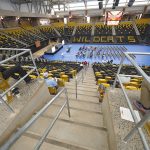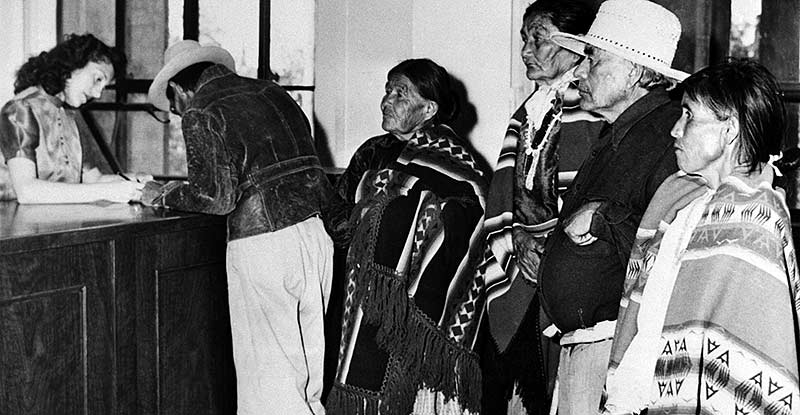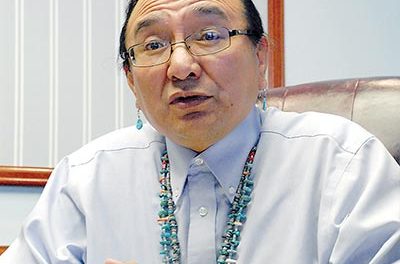
50 years ago: Fallout from DNA boss removal reaches D.C.

In 1948, after years of legal challenges, Native Americans in New Mexico gather to register to vote. (Courtesy of history.com)
The decision by members of the Navajo Tribal Council’s Advisory Committee to ban the director of DNA-People’s Legal Services from the Navajo Reservation has created a lot of controversy, not only in Window Rock but in Washington, D.C., as well. The committee made the decision last week after an incident between Ted Mitchell and one of the most powerful members of the Council, Annie Wauneka.
Wauneka became upset when she was asking questions about how to remove someone from the reservation when she heard Mitchell, who was sitting in the back of the chambers in the spectator’s section, laugh loudly. According to the reports in the Navajo Times, she then went back and hit Mitchell in the face, accusing him of disrespecting her and the committee.
Other committee members agreed and passed a resolution saying he was a danger to Navajo communities and ordered him off the reservation. This past week, he has been carrying out his duties as DNA director from his Gallup home, having attorneys meet him there as he tries to come up with a solution to the problem. He said he was making plans to set up an office at the El Rancho Hotel. He said he already apologized to Wauneka and the committee, although he added he did nothing wrong since he was not laughing at her but at a joke one of his associates told him.
The big question is whether he would lose his job and that was answered this past weekend when the DNA board met and passed a resolution totally supporting him and asking the committee to reverse its decision since, in their opinion, Mitchell has had nothing on his mind since coming to the reservation but to help the Navajo people.
To show their support, they decided to give him a $2,000 a year raise, bringing his salary up to $16,000 a year. All of the board members but one voted in favor of the two resolutions.
The lone holdout was Loncie Brown, wife of John Brown, who is a member of the Advisory Committee. She said it was wrong of Mitchell to laugh at Wauneka. She added that people like Mitchell came to the reservation to get rich off the Navajos and urged the board to cut the salaries of all the attorneys working for DNA. That resolution ever made it to the discussion stage.
In the meantime, officials for the Office of Navajo Economic Opportunity, which funded DNA, were meeting to decide how they would handle the situation. On one hand, they needed the tribal government’s support to have the program run well and appointing someone else to be director would be the easiest way to handle the problem.
But there were others who agreed with the board that Mitchell had been doing a good job and needed to be supported. The Times also reported that petitions were being circulated among clients served by DNA asking that the committee rethink what they did and take into consideration the effect of his removal would have on the services that DNA performs.
As this issue was going to press, Navajo Tribal Chairman Raymond Nakai issued a statement in support of the committee’s action and commented on reports in the off-reservation newspapers that the action has created tension on the reservation. “There is no tension,” he said. “There have been no demonstrations. There has been no riot.”
Daniel Peaches, who would become one of the most prolific letter writers to the Times, agreed with Nakai that the there was no tension as a result of Mitchell’s removal. But he disagreed that this was a good thing for the Navajos, pointing out that the committee’s action would make it harder to get dedicated attorneys to come to the reservation if they thought their profession would be placed in jeopardy.
In other news, George Wallace, who is running for U.S. president on the American Independence Party, wrote a letter to Nakai saying he was sorry he had to cancel a planned visit to the Navajo Reservation the week before because of weather and engine problems with his plane.
He said he has rescheduled his visit for Aug. 27 when he planned to make a major speech at the Window Rock Civic Center during which he would call for the federal government to stop meddling in the affairs of the Navajo government and turn over all control of BIA programs to the tribe.
Nakai, in his reply, said he was looking forward to the visit because he had always wanted to meet Wallace. Nakai had been a strong supporter of Bobby Kennedy until his death in June and he said he was willing to look at supporting Wallace if he was truly interested in helping the Navajo people and wasn’t just saying things just to get Navajo support.
And finally, the Navajo Times reported that a man in San Antonio, Texas, hearing about the poverty on the Navajo Reservation, had started collecting equipment, supplies and money that he planned to donate to the Navajo people. He told the Times that once he made it known that he was doing this, a lot of people took up the cause and he would have a truckload to bring to the reservation.
He also said he was on a local radio program in Texas talking about his plans when someone called in and asked how the Navajo people became so poor. “I told them that a long time ago, the Navajos had poor immigration laws,” he replied.
To read the full article, pick up your copy of the Navajo Times at your nearest newsstand Thursday mornings!
Are you a digital subscriber? Read the most recent three weeks of stories by logging in to your online account.







 Highway 264,
Highway 264, I-40, WB @ Winslow
I-40, WB @ Winslow